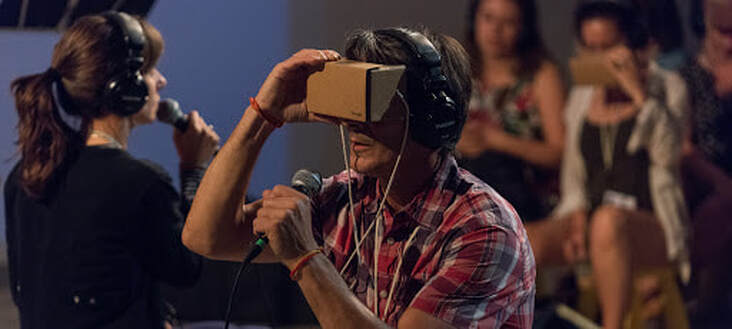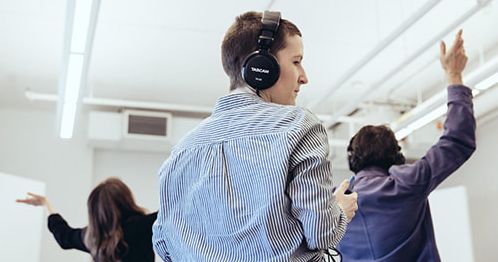|
#ThrowBackThursday. We decided that as interesting and all-consuming as the current pandemic moment is, the play/PLAY blog cannot be always mired in the present. And so, this post looks back to a play that I saw and wrote about in February. It is an example of one of the entries that we imagine will comprise the book in progress. The words that are in ALL CAPS indicate a page-flipping link to another (as yet unpublished) entry. If (following our core thesis) participation is always about participation, what is the role of participation in bluemouth inc.’s Café Sarajevo? Presented in a black box studio space in Toronto’s Theatre Centre, the play is framed as a live recording of a podcast. Company member Lucy Simic, who is the daughter of a Bosnian-born Croatian, is being interviewed about her experiences during a visit to Sarajevo in 2016, twenty years after the end of the civil war that held the city under lethal years-long siege by snipers. The cast and all audience members wear bluetooth headphones for the entire show through which we hear the mic’d dialogue as well as background scoring and other sound effects. Gloria, the stage manager cues the beginning of each scene recording, counting down the beats until we are ‘on air’ with “four,” “three,” switching to silent hand gestures “two,” and “one.” The podcast situation centres narrative storytelling and alleviates any need or expectation for realistic scenography or indeed for any scenography at all. Freed from visual mimesis, space is created for audience members to be recruited as unrehearsed voice-actors. About eight audience members (chosen during the pre-show) have been given lanyards with name tags. At intervals, they read from scripts on music stands, performing dialogue in partnership with the members of the company. One is the announcer who reads the sponsorship credits at the top of the podcast. Others are locals met in Sarajevo-- including guides Dino, Samara, and Jasmin. Through this collaboration, we populate Lucy’s story, bringing it into our bodies. A curious effect of this kind of selective participation is that even though not every audience member speaks, those who do become our PROXIES. Having come out of the audience mass, they are of us. We feel through them and with them differently than we do the actors. Something similar happens when four audience members become soccer players representing England and Croatia in the FIFA World Cup. The rest of us standing shoulder to shoulder, our toes outlining a large white rectangle taped on the floor, are both the watching crowd and the game boundary. We use our feet to keep the ball in play, tapping it if it rolls near. The enthusiasm of the players is infectious and the audience group becomes energized. When the ensuing fireworks cause the cast members (and with them the audience soccer players who mimic them) to drop to the floor covering and cowering as if sheltering from explosions, we are immediately sobered. The abrupt plummet from our adrenaline high is stunning. It is a powerful effect born out of our proxy participation. Another participatory feature of the performance-as-podcast is that the audience of about forty or so is entirely mobile. For each “scene” of the podcast, we arrange ourselves. Some people stand or lean on the walls, some sit on the floor closest to the actors. There are portable plastic stools. Then in the “off air” breaks between scenes, we are hastily herded into a new configuration elsewhere in the space. With each scene, we navigate and negotiate to find a space and a view. In addition to the live action, we are also given “cardboards.” These are handheld personal virtual reality viewers; little boxes with screens that we hold up to our faces. Inside are images of Lucy and Steven on their trip--on the steps of their apartment in Brooklyn, at Lucy’s mother’s house in Porec, driving down the road to Sarajevo, sitting in a café. We tilt our heads up and down. We turn around. Elbows akimbo we blindly bump, apologizing, into our neighbours. It strikes me that this exploratory combination of ASYMMETRY of our point-of-view positioning in relation to the actors and the accidental, but oh-so-polite incursions we make on each other as we continually shift shapes my understanding of Café Sarajevo. The podcast-within-the-play overtly presents its key question: “What causes people to divide? Are these divisions part of our nature? Or is it something else?” In the early days of the Trump administration in the US, we are invited to “tackle the question of why that sense of togetherness feels necessary, even urgent.” In a telling scene, Lucy is discomfited when ordering coffee in a Sarajevo cafe, she calls it “Turkish coffee” when the guide Dino calls it “Bosnian coffee.” Lucy is unsure if she is presenting as simply naive or whether she has revealed some kind of unintended political bias and Dino is now judging her. Something similar happens in a conversation with Samara who deflects Lucy’s questions about Muslim tourists in Sarajevo. Samara says, “It is no longer appropriate to ask a Sarajevan what religion they observe. Or our nationality. If someone asks us, we just smile and say we are Sarajevan.” In the closing moments of the play, we return to a video from the beginning--a televised debate from 1971 between Noam Chomsky and Michel Foucault. In this clip, Chomsky makes the point that power doesn’t imply justice or correctness and therefore it may be necessary to stage acts of civil disobedience to prevent the state from perpetrating criminal acts. Specifically in the context of the Vietnam War, his point is that illegal acts in support of anti-war views are right and proper. What, therefore, would constitute civil disobedience in the context of the Sarajevan civil war narrowly or more generally in the current divisive moment in US politics? How does civil disobedience counter sectarianism? The answer, the play suggests, lies in eschewing revenge and blame and embracing a kind of radical forgiveness; offering forgiveness even for the unforgivable. And this is where the participatory dramaturgy of Café Sarajevo neatly underscores this point, bringing the play’s understanding into our bodies. Audience proxies create affectionate bonds between strangers as the volunteer-actors are valued as “one of us.” Regardless of how they perform and independent of any specific personal characteristics, simply by virtue of being a proxy performer, that person stands in for the group as a whole, and we endorse them. Likewise, the mobile, closely-packed, bumper-car audience, isolated by our headphones and (at times) our VR viewers, is constantly engaged in negotiation for sight lines. We are far from sectarian violence to be sure, but in this very gentle way, through proximal and social INTIMACY, we are reminded that we are in this together and need to find ways to share the space and accommodate everyone. Engaged in participatory co-creation, we are all Café Sarajevans.
1 Comment
|


 RSS Feed
RSS Feed
